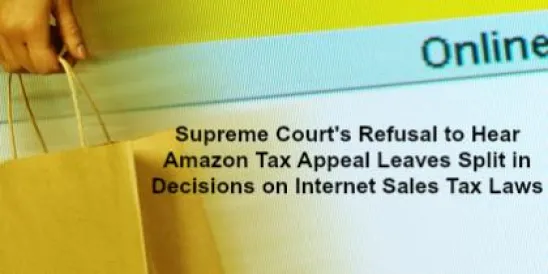The U.S. Supreme Court declined to hear an appeal from the highest state court in New York which affirmed a New York law requiring online retailers, such as Amazon and Overstock.com, to collect sales tax from New York customers even though these "etailers" do not have a physical presence in the state. The decision handed down earlier this year by the New York Court of Appeals contradicts rulings in several other states which have struck down these so-called "Amazon Laws" (See Illinois Supreme Court Ruling Invalidates "Amazon" Sales Tax Law).
Given the split of authority among state courts, many speculated that the issue was ripe for review by the Supreme Court. However, on December 2nd, without comment, the Supreme Court turned down the opportunity to bring conformity to the "Amazon Laws" and denied certiorari to hear Amazon’s appeal.
Earlier in 2013, Amazon and Overstock challenged New York’s tax law as unconstitutional, arguing that the law violated the Commerce Clause. On appeal, the New York Court of Appeals upheld the law as constitutional on its face. In analyzing the Internet retailers’ argument that the tax law violates the dormant Commerce Claim, the Court noted that the law would be upheld "(1) when the tax is applied to an activity with a substantial nexus with the taxing State, (2) is fairly apportioned, (3) does not discriminate against interstate commerce, and (4) is fairly related to the services provided by the State.'" Overstock.com, Inc. v. N.Y. State Dep't of Taxation & Fin., 2013 NY Slip Op 2102 (N.Y., 2013).
The parties agreed that the only factor at issue in the case was whether New York’s tax law was applied to an activity with a substantial nexus to the state of New York. In finding that Amazon’s activities did create a substantial nexus to the state, the Court relied on the fact that Amazon and Overstock use affiliates located in New York who operate websites which advertise and post links to Amazon and Overstock. The Court further explained that “the Appellate Division record in this case contains examples of such websites urging their local constituents to support them by making purchases through their Amazon links. Essentially, through these types of affiliation agreements, a vendor is deemed to have established an in-state sales force.” Id. Thus, these "in-state sales forces" created the substantial nexus between Amazon and Overstock and the state sufficient to uphold the tax law.




 />i
/>i

